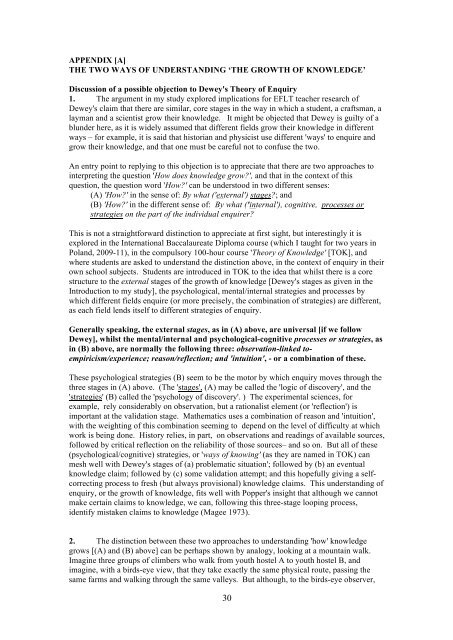RADICAL TEFL
2hqhXJd
2hqhXJd
Create successful ePaper yourself
Turn your PDF publications into a flip-book with our unique Google optimized e-Paper software.
APPENDIX [A]<br />
THE TWO WAYS OF UNDERSTANDING ‘THE GROWTH OF KNOWLEDGE’<br />
Discussion of a possible objection to Dewey's Theory of Enquiry<br />
1. The argument in my study explored implications for EFLT teacher research of<br />
Dewey's claim that there are similar, core stages in the way in which a student, a craftsman, a<br />
layman and a scientist grow their knowledge. It might be objected that Dewey is guilty of a<br />
blunder here, as it is widely assumed that different fields grow their knowledge in different<br />
ways – for example, it is said that historian and physicist use different 'ways' to enquire and<br />
grow their knowledge, and that one must be careful not to confuse the two.<br />
An entry point to replying to this objection is to appreciate that there are two approaches to<br />
interpreting the question 'How does knowledge grow?', and that in the context of this<br />
question, the question word 'How?' can be understood in two different senses:<br />
(A) 'How?' in the sense of: By what ('external') stages?; and<br />
(B) 'How?' in the different sense of: By what ('internal'), cognitive, processes or<br />
strategies on the part of the individual enquirer?<br />
This is not a straightforward distinction to appreciate at first sight, but interestingly it is<br />
explored in the International Baccalaureate Diploma course (which I taught for two years in<br />
Poland, 2009-11), in the compulsory 100-hour course 'Theory of Knowledge' [TOK], and<br />
where students are asked to understand the distinction above, in the context of enquiry in their<br />
own school subjects. Students are introduced in TOK to the idea that whilst there is a core<br />
structure to the external stages of the growth of knowledge [Dewey's stages as given in the<br />
Introduction to my study], the psychological, mental/internal strategies and processes by<br />
which different fields enquire (or more precisely, the combination of strategies) are different,<br />
as each field lends itself to different strategies of enquiry.<br />
Generally speaking, the external stages, as in (A) above, are universal [if we follow<br />
Dewey], whilst the mental/internal and psychological-cognitive processes or strategies, as<br />
in (B) above, are normally the following three: observation-linked toempiricism/experience;<br />
reason/reflection; and 'intuition', - or a combination of these.<br />
These psychological strategies (B) seem to be the motor by which enquiry moves through the<br />
three stages in (A) above. (The 'stages', (A) may be called the 'logic of discovery', and the<br />
'strategies' (B) called the 'psychology of discovery'. ) The experimental sciences, for<br />
example, rely considerably on observation, but a rationalist element (or 'reflection') is<br />
important at the validation stage. Mathematics uses a combination of reason and 'intuition',<br />
with the weighting of this combination seeming to depend on the level of difficulty at which<br />
work is being done. History relies, in part, on observations and readings of available sources,<br />
followed by critical reflection on the reliability of those sources– and so on. But all of these<br />
(psychological/cognitive) strategies, or 'ways of knowing' (as they are named in TOK) can<br />
mesh well with Dewey's stages of (a) problematic situation'; followed by (b) an eventual<br />
knowledge claim; followed by (c) some validation attempt; and this hopefully giving a selfcorrecting<br />
process to fresh (but always provisional) knowledge claims. This understanding of<br />
enquiry, or the growth of knowledge, fits well with Popper's insight that although we cannot<br />
make certain claims to knowledge, we can, following this three-stage looping process,<br />
identify mistaken claims to knowledge (Magee 1973).<br />
2. The distinction between these two approaches to understanding 'how' knowledge<br />
grows [(A) and (B) above] can be perhaps shown by analogy, looking at a mountain walk.<br />
Imagine three groups of climbers who walk from youth hostel A to youth hostel B, and<br />
imagine, with a birds-eye view, that they take exactly the same physical route, passing the<br />
same farms and walking through the same valleys. But although, to the birds-eye observer,<br />
30


